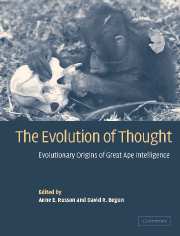Book contents
- Frontmatter
- Contents
- List of Contributors
- Preface
- 1 Evolutionary reconstructions of great ape intelligence
- 2 Enhanced cognitive capacity as a contingent fact of hominid phylogeny
- PART I COGNITION IN LIVING GREAT APES
- Introduction
- 3 The manual skills and cognition that lie behind hominid tool use
- 4 The cognitive complexity of social organization and socialization in wild baboons and chimpanzees: guided participation, socializing interactions, and event representation
- 5 Gestural communication in the great apes
- 6 Great ape cognitive systems
- PART II MODERN GREAT APE ADAPTATION
- PART III FOSSIL GREAT APE ADAPTATIONS
- Part IV INTEGRATION
- Author index
- Species index
- Subject index
3 - The manual skills and cognition that lie behind hominid tool use
Published online by Cambridge University Press: 20 August 2009
- Frontmatter
- Contents
- List of Contributors
- Preface
- 1 Evolutionary reconstructions of great ape intelligence
- 2 Enhanced cognitive capacity as a contingent fact of hominid phylogeny
- PART I COGNITION IN LIVING GREAT APES
- Introduction
- 3 The manual skills and cognition that lie behind hominid tool use
- 4 The cognitive complexity of social organization and socialization in wild baboons and chimpanzees: guided participation, socializing interactions, and event representation
- 5 Gestural communication in the great apes
- 6 Great ape cognitive systems
- PART II MODERN GREAT APE ADAPTATION
- PART III FOSSIL GREAT APE ADAPTATIONS
- Part IV INTEGRATION
- Author index
- Species index
- Subject index
Summary
Tool use is an important aspect of being human that has assumed a central place in accounts of the evolutionary origins of human intelligence. This has inevitably focused a spotlight on any signs of tool use or manufacture in great apes and other nonhuman animals, to the relative neglect of skills that do not involve tools. The aim of this chapter is to explore whether this emphasis is appropriate. Suppose we take a broader view, accepting evidence from all manifestations of manual skill, what can we learn of the mental capacities of the great apes and the origins of human intelligence? My own ultimate purpose is to use comparative evidence from living species to reconstruct the evolutionary history of the many cognitive traits that came together to make human psychology. The cognition of great apes is the obvious starting point, to trace the more primitive (i.e., ancient) cognitive aptitudes that are still important to us today. In this chapter, I focus on great ape cognition as it is expressed in manual skills, based on cognitive aspects of tool use and manufacture considered significant in the human evolutionary lineage.
WHY IS TOOL USE IMPORTANT IN THE STUDY OF HUMAN EVOLUTION?
Consider first what aspects of tool use have recommended it as “special” to physical anthropologists and archaeologists. Most obviously, tools are convenient things for investigators. As physical objects, they can be collected, measured, and compared with ease.
Information
- Type
- Chapter
- Information
- The Evolution of ThoughtEvolutionary Origins of Great Ape Intelligence, pp. 31 - 44Publisher: Cambridge University PressPrint publication year: 2004
Accessibility standard: Unknown
- 51
- Cited by
